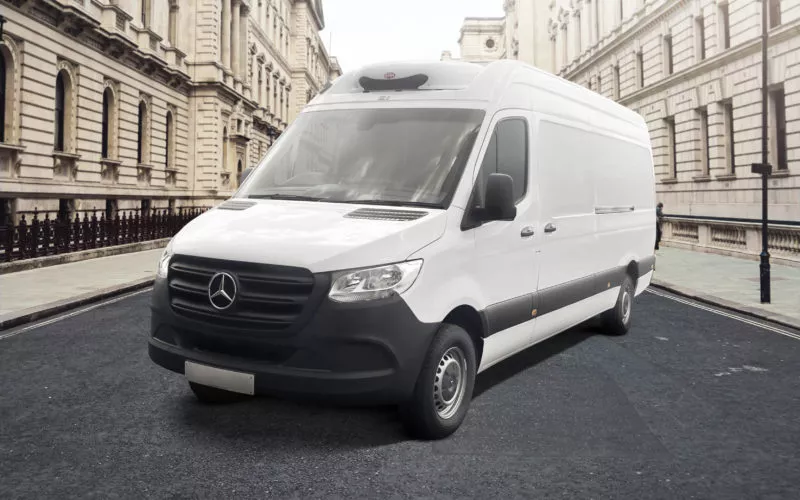If you’re operating a fleet of fridge vans, then you’ll know that downtime over even short periods of time isn’t an option. Yet, commercially-operated fridge vans tend to cover more miles and be subject to more wear and tear than regular private vehicles. So, what’s the answer? Keep reading and CoolKit will tell you the top five ways to maximise your fridge van fleet uptime…
1. Schedule van and fridge servicing simultaneously
Regular maintenance of both your vans and their fridges is essential.
In addition to regular preventative maintenance such as checking the van’s oil and coolant, inspecting tyre tread depth, and ensuring that the lights are operating effectively, it’s important to ensure that full services are also carried out on a periodic basis.
However, if you’re not careful, services can lead to more downtime than necessary.
To avoid this, schedule both services simultaneously- that is, make sure the van and its cooling unit are serviced at the same time.
Getting into the habit of doing this also ensures that neither asset (the van or the cooling unit) inadvertently misses a crucial service.
2. Invest in telematics
Telematics can help you to maintain fridge van fleet uptime by allowing you to collect valuable data.
With over 40% of UK businesses using some form of telematics, it’s clearly an increasingly popular tool. It’s easy to see why; telematics allows fleet operators to collect data on a range of vehicle and driver behaviours as well as real-time vehicle locations, engine diagnostics and more.
Telematics systems collect data via a variety of tools including cameras, sensors, and GPS trackers, with the resulting data then being fed into a digital dashboard where fleet managers can effectively analyse it.
Telematics can help to substantially reduce downtime as it allows fleet managers to monitor the health of fridge vans and then build up a highly-predictive fleet preventative maintenance strategy.
In the best cases, telematics allows fleet maintenance to become an almost completely automated process – freeing up fleet managers’ time for other tasks.
3. Utilise standby for pre-cooling load space
A significant reason for fridge van downtime is loading. The longer a vehicle sits empty, the less time it’s out on the road contributing to your company’s bottom line.
With fridge vans, it helps to ensure that their load space is pre-cooled, so that their refrigerated cargo can be loaded straight away as soon as it’s ready.
Having to wait for the load space to reach the required temperature before cargo can be loaded, is an avoidable cause of downtime.
It’s also helpful to ensure that your cargo is pre-chilled prior to loading too – as any extra heat added to the van will delay it reaching the correct temperature.
Likewise, loading-related downtime can be avoided by loading the vehicle the night before it is due to depart. This allows the driver to depart exactly on time, maximising uptime and time on the road.
It can also help, particularly during the summer months, to park your fridge vans in the shade, this not only will reduce the amount of work the fridge unit will have to do, but it’ll ensure that the van can reach the appropriate temperature quicker.
4. Don’t remove items from the conversion
For a fridge unit to operate correctly it’s important that all of the original elements from the conversion are retained.
One of the most common things that can lead to the malfunctioning of a fridge unit is the removal of components such as the rear curtains or door skins with insulation.
Whilst it may seem inconvenient having to load cargoes through the rear curtains, it’s essential that you retain them as they prevent cool air from escaping and reduce the strain on the cooling unit.
Equally, whilst it may be tempting to remove the door skins in order to free up a bit more cargo space, these contain important insulation.
5. Replace your vehicle before it gets too old
Whilst preventative maintenance is important – and can significantly prolong the life of your fridge vans – it’s important to recognise that vans and their cooling units do have limited lifespans.
At some point, it will be financially more sensible to replace your fridge vans rather than paying ever more for maintenance and spares.
But, when is the right time?
This is a question which vexes many a fleet manager.
There are three common methods used to decide when a fridge van should be replaced:
- The simplest way to decide when your fridge vans should be replaced is to decide upon a set mileage/age criteria e.g. 100,000 miles or eight years. As soon as your fridge vans reach either the designated age or mileage limit, they are replaced.
- Conduct an economic life cycle analysis. This will help you to understand the total cost of ownership, allowing you to find the replacement point where the cost of replacement is less than the cost of ongoing maintenance.
- Simply replace your fridge vans when their maintenance and repair costs exceed a set amount. This does require close record keeping of your fleet, but it is generally a cost-effective method of deciding upon vehicle replacement.
CoolKit: the home of fridge van conversions
Is it time to replace your ageing fridge van? If your current fleet is struggling to maintain adequate uptime, then speak to CoolKit today.
Not only are we the UK’s leading fridge van conversion company, that provides award-winning conversions, but we can also provide servicing – meaning we can support you through the complete lifecycle of your fridge van fleet. Don’t just take our word for it though, check out what some of our satisfied customers have to say.
Find out more about CoolKit’s refrigerated van conversions today
For more fridge and freezer van information and advice, explore the CoolKit blog…

